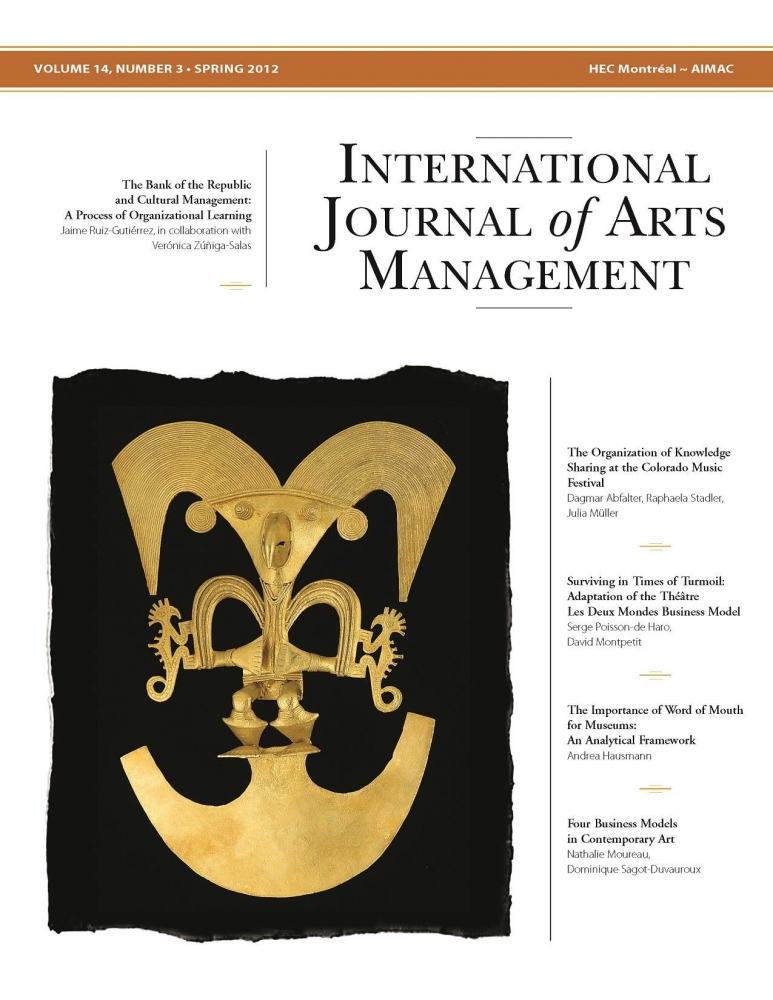IJAM Volume 14 Number 3 (PDF)
Product: Journal
$53.00 CA
EDITOR’S NOTE
Dear readers,
The Spring 2012 issue of the International Journal of Arts Management presents five articles that clearly reflect the international scope of the Journal. The authors address management issues in cultural organizations located in the United States, Canada, Germany, France and Colombia.
We would like to take this opportunity to announce that the next AIMAC conference will be held from 29 June to 2 July 2013 in Bogotá, Colombia. This will be the first time that AIMAC has been hosted in South America. We thank Professor Jaime Ruiz-Gutiérrez of the Universidad de los Andes School of Management for extending this invitation and we look forward seeing you there in large numbers. In addition to the conference itself, we will have the pleasure of discovering the rich cultural treasures and events offered by this magnificent city.
The themes addressed in this issue of IJAM concern the different approaches to coping with changes in the environment. In the first article, Dagmar Abfalter, Raphaela Stadler and Julia Müller set out to deepen our understanding of the approach to management and knowledge sharing in an event-planning organization involving a festival. In contrast to organizations whose activities are offered throughout the year, festivals – and their organizers – face the challenge of managing large teams within a short time span. What adjustments does this require in terms of management, the transmission and sharing of knowledge, and learning? The authors undertake to answer this question based on their survey of various participants in the Colorado Music Festival.
In the second contribution, Serge Poisson-de Haro and David Montpetit describe their longitudinal study of Théâtre Les Deux Mondes, a Canadian company that tours abroad and must adapt rapidly to changes in its internal and external environments. The authors point out that, in today’s turbulent times, when environmental factors are constantly evolving, it is important for companies to clearly understand and follow their business model in order to avoid major problems in the medium and long terms.
Andrea Hausmann, in an article titled “The Importance of Word of Mouth for Museums: An Analytical Framework,” focuses on the importance of using new technologies and social media to promote cultural events. The author proposes an analytical framework that could be used by researchers and managers to reflect on the impact of technology on the marketing of cultural events from a research and management perspective.
In their contribution, Nathalie Moureau and Dominique Sagot-Duvauroux suggest that innovation not only changes the process of artistic production, but also has an impact on the business models used in the promotion and dissemination of art. These authors propose a typology based on 200 interviews with actors in the field of contemporary art.
Finally, the company profile describes the process by which the Bank of the Republic of Colombia, a state-run central bank responsible for issuing currency, came to incorporate the collection and preservation of cultural artifacts and sites into its institutional activities. Jaime Ruiz-Gutiérrez and Verónica Zúñiga analyze the development of these activities from the perspective of organizational learning.
Thank you for your interest in IJAM!
Johanne Turbide
Editor
